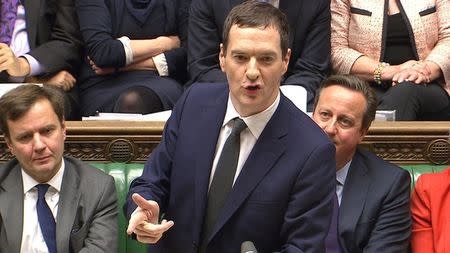UK public-spending plan has 50-50 chance of success -think tank
By David Milliken
LONDON (Reuters) - British finance minister George Osborne's latest spending plans have a roughly 50 percent chance of success, the head of the country's non-partisan Institute for Fiscal Studies (IFS) think tank said on Thursday.
Osborne stuck to his commitment of turning a budget deficit into a surplus by 2020 in a mid-year budget update on Wednesday, confounding predictions that he might have to rein in his ambitions for putting public finances in the black.
But the IFS - which releases a closely watched analysis after each British budget statement - said Osborne had little room for manoeuvre if growth was weaker than expected, tax revenues fell short or spending proved intractable.
"He's going to need his luck to hold out. He has set himself a completely inflexible fiscal target - to have a surplus in 2019/20. This is not like the friendly, flexible fiscal target of the last parliament," IFS director Paul Johnson said.
"If he is unlucky - and that's pretty much a 50/50 shot - he will either have to revisit the spending decisions, raise taxes, or abandon the target."
Osborne has made a balanced budget the centrepiece of his time in office since 2010. But he is only half way through an austerity push he once planned to have completed by now.
"This is not the end of 'austerity'. This spending review is still one of the tightest in post-war history," Johnson said.
The big feature of Osborne's budget update was abandoning plans to scrap tax credit payments to low earners before they are replaced by a new benefit - universal credit.
But the IFS said this would offer only temporary relief to Britain's poorest. Under the new benefit, spending on welfare for working-age Britons would fall to a 30-year low as a share of national income.
"The chancellor hasn't gone soft," IFS researcher Andrew Hood said. "In the long run, the system will be significantly less generous to low-income families, both in and out of work. That is the big headline, not the U-turn."
IFS figures showed that by 2020, 2.6 million working families would lose on average 1,600 pounds ($2,420) in benefits a year and 1.2 million non-working households would lose 2,500 pounds. Several million other families would gain, but by less.
Labour Party finance spokesman John McDonnell said the IFS figures showed that Osborne's plans were unravelling.
"We said this was a smoke-and-mirror spending review and we were right," he told reporters.
A finance ministry spokesman said it was inappropriate to compare the benefits individuals received now with the universal credit, and that existing claimants could freeze their current cash entitlement rather than switch to universal credit.
(Additional reporting by Andy Bruce; Editing by Louise Ireland)





